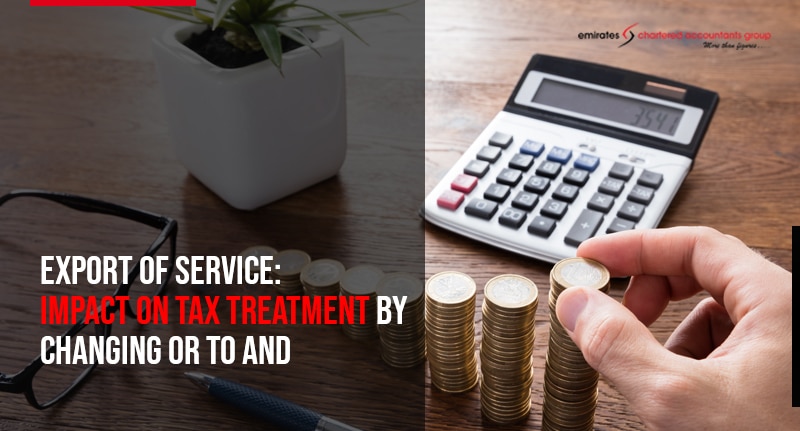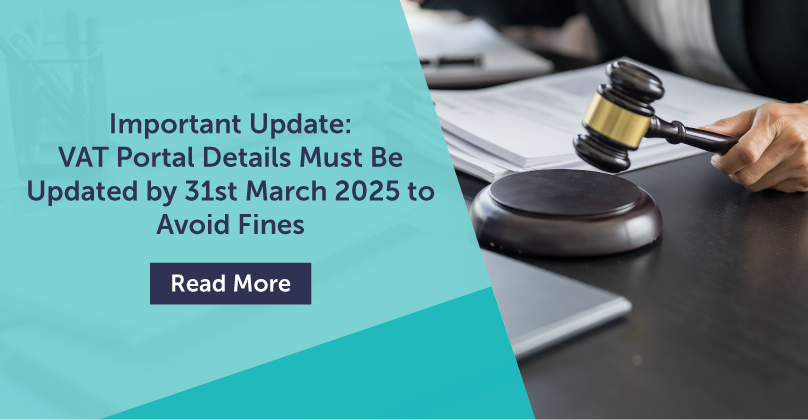
UAE VAT Law Latest Amendment
Is the UAE VAT executive regulation amended? What are the changes made in the UAE VAT Law and how will that impact the transactions? These are some latest questions raised related to the amendment in the Executive Regulation of the Federal Decree-Law No. 8 of 2017 on Value Added Tax. It is always important to review the tax treatment followed based on the changes or amendments made in the UAE VAT Law or with the clarifications or guidance issued by the authority on UAE VAT Law. Let us have a look at the major changes noted in The Executive Regulation of the Federal Decree-Law No. 8 of 2017 on Value Added Tax.
The Export of service was always a topic of discussion since the UAE VAT law was implemented. The main reason for such discussion is that services may be provided in different ways from different locations despite the borders and regulations of the customs authority. Various facts like the location of the service provider and recipient, the actual place of service, place of supply rules etc made the taxation of services complicated. Unlike goods, which is traced by customs upon its clearance, services provided cross borders became a little complicated in the absence of such tracing.
Executive Regulation of the Federal Decree-Law No. 8
It was very recently, that the Federal Tax Authority has issued The Executive Regulation of the Federal Decree-Law No. 8 of 2017 on Value Added Tax (Cabinet Decision No. 46 of 2020), which is an updated or revised Executive Regulation of UAE VAT Law initially issued on 26 November 2017.
The major change noticed in the new document is related to Article 31 – Zero-rating the export of services. Article 31 gives the guidelines on when a supply of service can be considered as zero-rated as per UAE VAT Law. One of the cases where a service will become zero-rated under UAE VAT Law is that, the Services are supplied to a non-resident (who does not have a Place of Residence) in the UAE and who is outside the State at the time the Services are performed. So, it is to be understood that the tax treatment may change if the recipient of the service is inside UAE or outside UAE.
The changes made in the UAE VAT Law or VAT executive regulation is on defining the person outside the UAE. As per the amended executive regulation, “For the purpose of paragraph (a) of Clause 1 of this Article, a person shall be considered as being “outside the State” if they only have a short-term presence in the State of less than a month and the presence is not effectively connected with the supply.” The change given in the amended executive regulation is a simple change of AND instead of OR used earlier. But the VAT Impact of this small change is the big one.
Interpretation of the Law
On a straight interpretation, we can say that the result of this change is that the scope of export of service is narrowed further. According to the new clause, a person will be considered outside UAE only if his presence in UAE is less than a month and at the same time his stay is not connected with the service provided. Hence, we need to understand that when a non-resident person is present in the state and such presence in connection with the service provided from UAE, then the non-resident person will not be considered as “outside the UAE for VAT purpose”. Accordingly, the transaction may not qualify the zero-rating of export of service and need to be taxed at the standard rate. We need to understand that the conjunction ‘AND’ used in the sentence make both conditions to be qualified to consider a person as outside the UAE for VAT purpose.
To understand it better if we consider a person from the UK is receiving a service from a supplier in the UAE. The taxability of the service will be based on the duration of his stay and the effective connection on the service received when he is in the UAE.
For example:
If the length of the stay is more than a month, then the person cannot be considered as outside the UAE for VAT purpose and may be taxed at 5%. But let us consider the length of the stay is only 10 days (less than a month), then he may be considered as a person outside the state after considering the effective relationship with the service received, which means that if the service provided is effectively connected with his presence then the supply will not be eligible for zero-rating of export of service.
So the change of the conjunction used in the Article 31 (2) of the Executive Regulation of the Federal Decree-Law No. 8 of 2017 on Value Added Tax has eliminated the advantage of satisfying only one condition and still considered as a person outside UAE. Accordingly, where the service is provided to a non-resident, the tax treatment will not be zero-rated if;
- The person stays more than a month in the UAE or
- His stay is effectively connected with the service provided even though the stay in UAE is less than a month.
Emirates Chartered Accountants Group is a Registered Tax Agent with the Federal Tax Authority under Emirates International Chartered Accountants Group. Our Tax Professionals are highly qualified and well versed with the UAE VAT Law with the practical implementation of VAT in UAE and Bahrain. We understand that every business is different from the other. Hence, each of our services is tailored as per your business needs.
Looking for TAX Services in the UAE? We are happy to assist.
- Tax Agent’s Service
- VAT Return Filing
- VAT Service
- VAT Registration
- Excise Tax Service
- VAT Deregistration
For Tax Services in Dubai:
Mr. Pradeep Sai
sai@claemirates.com
+971 – 556530001
For Tax Services in Abu Dhabi:
Mr. Navaneeth
nav@claemirates.com
+971 – 558892750
For Tax Services in Northern Emirate (Sharjah, Ajman, RAK, Fujairah)
Mr. Praveen
praveen@claemirates.com
+971 – 508873115




